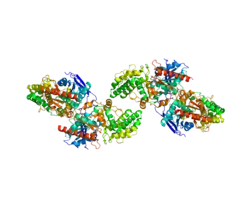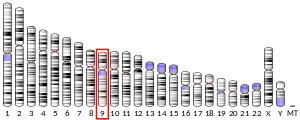DPP7
Dipeptidyl-peptidase 2 is an enzyme that in humans is encoded by the DPP7 gene.[5][6][7]
The protein encoded by this gene is a post-proline cleaving aminopeptidase expressed in quiescent lymphocytes. The resting lymphocytes are maintained through suppression of apoptosis, a state which is disrupted by inhibition of this novel serine protease. The enzyme has strong sequence homology with prolylcarboxypeptidase and is active at both acidic and neutral pH.[7]
References
- GRCh38: Ensembl release 89: ENSG00000176978 - Ensembl, May 2017
- GRCm38: Ensembl release 89: ENSMUSG00000026958 - Ensembl, May 2017
- "Human PubMed Reference:". National Center for Biotechnology Information, U.S. National Library of Medicine.
- "Mouse PubMed Reference:". National Center for Biotechnology Information, U.S. National Library of Medicine.
- Chiravuri M, Schmitz T, Yardley K, Underwood R, Dayal Y, Huber BT (Oct 1999). "A novel apoptotic pathway in quiescent lymphocytes identified by inhibition of a post-proline cleaving aminodipeptidase: a candidate target protease, quiescent cell proline dipeptidase". J Immunol. 163 (6): 3092–9. PMID 10477574.
- Fukasawa KM, Fukasawa K, Higaki K, Shiina N, Ohno M, Ito S, Otogoto J, Ota N (Jan 2001). "Cloning and functional expression of rat kidney dipeptidyl peptidase II". Biochem J. 353 (Pt 2): 283–90. doi:10.1042/0264-6021:3530283. PMC 1221570. PMID 11139392.
- "Entrez Gene: DPP7 dipeptidyl-peptidase 7".
Further reading
- Fornas E, Mayordomo F, Renau-Piqueras J, Alborch E (1992). "Effect of cholesterol and its autooxidation derivatives on endocytosis and dipeptidyl peptidases of aortic endothelial cells". Histol. Histopathol. 7 (2): 163–8. PMID 1515698.
- Roberts VJ, Gorenstein C (1990). "The effect of antimitotic agents on the intraneuronal distribution of lysosomes". Brain Res. 521 (1–2): 62–72. doi:10.1016/0006-8993(90)91525-L. PMID 2207678. S2CID 10381435.
- Andersen KJ, McDonald JK (1989). "Lysosomal heterogeneity of dipeptidyl peptidase II active on collagen-related peptides". Ren. Physiol. Biochem. 12 (1): 32–40. doi:10.1159/000173177. PMID 2727382.
- Demuth HU, Schlenzig D, Schierhorn A, et al. (1993). "Design of (omega-N-(O-acyl)hydroxy amid) aminodicarboxylic acid pyrrolidides as potent inhibitors of proline-specific peptidases". FEBS Lett. 320 (1): 23–7. doi:10.1016/0014-5793(93)81649-K. PMID 8096464. S2CID 24505098.
- Underwood R, Chiravuri M, Lee H, et al. (1999). "Sequence, purification, and cloning of an intracellular serine protease, quiescent cell proline dipeptidase". J. Biol. Chem. 274 (48): 34053–8. doi:10.1074/jbc.274.48.34053. PMID 10567372.
- Chiravuri M, Agarraberes F, Mathieu SL, et al. (2000). "Vesicular localization and characterization of a novel post-proline-cleaving aminodipeptidase, quiescent cell proline dipeptidase". J. Immunol. 165 (10): 5695–702. doi:10.4049/jimmunol.165.10.5695. PMID 11067927.
- Araki H, Li Y, Yamamoto Y, et al. (2001). "Purification, molecular cloning, and immunohistochemical localization of dipeptidyl peptidase II from the rat kidney and its identity with quiescent cell proline dipeptidase". J. Biochem. 129 (2): 279–88. doi:10.1093/oxfordjournals.jbchem.a002855. PMID 11173530.
- Zhan H, Yamamoto Y, Shumiya S, et al. (2002). "Peptidases play an important role in cataractogenesis: an immunohistochemical study on lenses derived from Shumiya cataract rats". Histochem. J. 33 (9–10): 511–21. doi:10.1023/A:1014943522613. PMID 12005022. S2CID 29588226.
- Strausberg RL, Feingold EA, Grouse LH, et al. (2003). "Generation and initial analysis of more than 15,000 full-length human and mouse cDNA sequences". Proc. Natl. Acad. Sci. U.S.A. 99 (26): 16899–903. doi:10.1073/pnas.242603899. PMC 139241. PMID 12477932.
- Leiting B, Pryor KD, Wu JK, et al. (2003). "Catalytic properties and inhibition of proline-specific dipeptidyl peptidases II, IV and VII". Biochem. J. 371 (Pt 2): 525–32. doi:10.1042/BJ20021643. PMC 1223300. PMID 12529175.
- Lehner B, Sanderson CM (2004). "A Protein Interaction Framework for Human mRNA Degradation". Genome Res. 14 (7): 1315–23. doi:10.1101/gr.2122004. PMC 442147. PMID 15231747.
- Gerhard DS, Wagner L, Feingold EA, et al. (2004). "The Status, Quality, and Expansion of the NIH Full-Length cDNA Project: The Mammalian Gene Collection (MGC)". Genome Res. 14 (10B): 2121–7. doi:10.1101/gr.2596504. PMC 528928. PMID 15489334.
This article is issued from Wikipedia. The text is licensed under Creative Commons - Attribution - Sharealike. Additional terms may apply for the media files.




